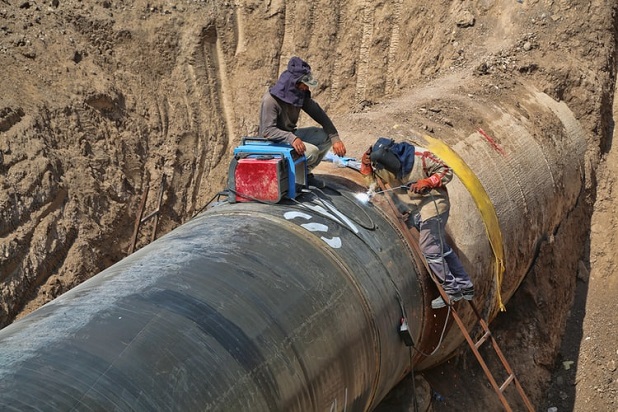Customers shopping at a local supermarket. FILE PHOTO | NMG
Panic shopping set in across Nairobi from last Friday as Kenyans braced for a hotly contested presidential polls election Tuesday.
Despite government assurances that on August 9 will cause no major disruptions to supplies, shoppers appeared to be stockpiling, given the empty shelves witnessed on many supermarket shelves.
A spot check by the Business Daily in Nairobi showed many people were flocking to supermarkets and retail stores to stock up on longer-shelf-life food items such as maize flour, rice, milk, sugar, and cooking oil.
Retailers and shoppers said the rush by city residents to stockpile foodstuffs has prompted a scarcity of supplies, including the subsidised maize flour that retails at Sh100 per two-kilo packet.
“We are stocking up even though we do not expect that there will be any disruption. It is just a matter of being on the safe side,” said David Kimondo, a father of two, while shopping at a retail store within the Two Rivers Mall.
However, weak economic activity has constrained emergency stocking measures by some Kenyans.
“I have only managed to buy a few essentials like cooking oil, maize flour and rice because I do not have adequate cash,” said Mary Wambui, a mother of three who shopped at a supermarket in Nairobi’s central business district (CBD).
On Friday, the Business Daily encountered long lines at various retail stores in Nairobi’s CBD, including supermarkets. Some retail outlets had empty or dwindling stocks on the shelves as customers rushed to make their picks.
Long queues were also witnessed in the grocery markets in Muthurwa and Marikiti fresh produce markets as shoppers bought cereals. Fuel stations also received an increased number of customers looking to stock up on cooking gas.
Kenya’s elections have often been characterised by unrest and violence, most notably in 2007 and 2017, costing businesses billions of shillings in lost earnings and damages. Some retailers, however, linked the shopping frenzy to school closure and mandatory holidays ahead of the polls.
“[Political uncertainty around the polls] is a small factor in the upsurge in shopping,” said Naivas’ chief commercial officer, Willy Kimani. Authorities last week sought to discourage panic-buying of goods ahead of Tuesday’s polls as the State would guarantee minimal disruption.
Interior Principal Secretary Karanja Kibicho said Thursday that adequate security personnel has been deployed across the country to maintain law and order before, during, and after the elections.
In May, the National Cohesion and Integration Commission listed Nairobi, Nakuru, Kericho, Kisumu, Uasin Gishu and Mombasa counties as the likeliest to experience election-related unrest, ideally giving authorities and civil groups time to roll out measures to forestall any skirmishes.
The impending closure of the retail outlets has also contributed to the panic buying. “You are hereby informed that all the 84 Naivas outlets will remain closed on 9th August 2022,” said Naivas in a notice.
“Normal operations will resume on 10th August 2022. We urge you to carry out prior shopping to be well stocked and avoid conveniences.”
“Customers are buying foodstuffs across but demand for maize flour started when prices were dropped,” an attendant at one of the Naivas stores said.
Kenya is the main route for imports into Uganda, with oil from international sources delivered to Eldoret, where other Northern Corridor countries of Uganda, South Sudan, Rwanda and eastern DR Congo pick it for transportation to their markets.
While there has not been major election-related violence in the current campaigns, the ghosts of the 2007/8 violence continue to haunt importers and transporters on the Northern Corridor. On Friday, the Kenya Bankers Association (KBA) said it was assessing lower risk levels associated with the upcoming polls compared to previous ones.
KBA chief executive Habil Olaka said there is growing confidence in the country’s ability to handle political transitions without much economic disruption. Besides Naivas, Carrefour and Quickmart, the Business Daily also established a spike in purchases for fresh vegetables and meat, which are also forecast to have jumps in demand.
Shoppers say they will be snacking out of boredom at their homes while also using the foodstuffs to keep them busy watching the election results.
“I have bought the usual house shopping and snacks for boredom. I need to get popcorn for watching results,” a shopper said. At City Park Market in Parklands, Grace Wanjiru who stocks cauliflower, avocado, courgettes, carrots and broccoli, was on Friday morning adding her inventory to meet the demand she anticipated in the four days to the date of the election.
“What we have bought today (August 5) we will sell until Monday (today). We expect customers to come in large numbers and we already started to see the signs,” she said.
The grocers say farmers have cut produce transported to the markets due to anticipation of interruptions over the election period. As a result, Jack Obonyo says the price of one kilogramme of okra has increased to Sh150 from Sh100 within a week due to a shortage in supplies.
The price of green chilli pepper has also increased to Sh200 a kilo from Sh150.He stocks cucumber, eggplants, valori, French beans, and bottle and ridge gourd.
“We are seeing an increasing flow of customers; I don’t know whether they are experiencing tension,’’ said John Kimathi.
“Suppliers are scared of bringing in a lot of the produce.”
-Business Daily





